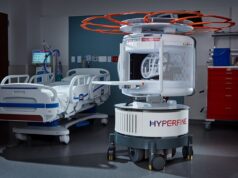 Hyperfine has announced the presentation of two studies at the 2025 International Stroke Conference (ISC; 5–7 February, Los Angeles, USA) that provide evidence supporting the value of artificial intelligence (AI)-powered portable magnetic resonance imaging (MRI) via its US Food and Drug Administration (FDA)-cleared Swoop system in acute ischaemic stroke triage and diagnosis. Notably, this includes patient data in the ACTION PMR study, according to the company.
Hyperfine has announced the presentation of two studies at the 2025 International Stroke Conference (ISC; 5–7 February, Los Angeles, USA) that provide evidence supporting the value of artificial intelligence (AI)-powered portable magnetic resonance imaging (MRI) via its US Food and Drug Administration (FDA)-cleared Swoop system in acute ischaemic stroke triage and diagnosis. Notably, this includes patient data in the ACTION PMR study, according to the company.
Ohio State University (Columbus, USA), an ACTION PMR site, presented its data from the study, showing that physicians were able to use Swoop system images to diagnose 90% of acute infarcts seen on conventional high-field MRI—the standard of care—and also demonstrated diffusion-weighted imaging fluid-attenuated inversion recovery (DWI-FLAIR) mismatch, which is considered a key method for identifying acute ischaemic stroke.
Researchers from Massachusetts General Hospital (Boston, USA) also presented data on stroke detection, showing that images from the Swoop system enabled accurate differentiation of stroke versus stroke mimics with strong agreement to high-field MRI, indicating the Swoop system’s value in evaluating patients with suspected stroke and transient ischaemic attack (TIA).
The ACTION PMR study is a prospective, international, multisite observational study that aims to examine the value and role of brain imaging with the Swoop portable MR brain imaging system in acute ischaemic stroke diagnosis and treatment. Enrolment in the study is complete with 100 patients at four leading institutions in the USA and Europe—the University at Buffalo (Buffalo, USA) and the University of Glasgow (Glasgow, UK), as well as the Ohio State University Wexner Medical Center and Massachusetts General Hospital. These patients enabled a direct comparison of stroke detection between portable MRI and the standard of care as a means to assess the utility of Swoop system images in stroke detection, Hyperfine details in a recent press release.
The company goes on to note that ACTION PMR data have been presented at multiple leading conferences throughout the study progression, including the annual meetings of the Radiological Society of North America (RSNA) and the European Society of Neuroradiology (ESNR). Taken together, data from patients in ACTION PMR have shown that physician diagnosis using AI-powered portable MRI images produced substantial agreement with physician diagnosis using standard-of-care imaging in detecting acute ischaemic strokes, and the Swoop system showed a faster time to scan compared to conventional MRI and good specificity in emergency stroke care.
“Since ACTION PMR launched in July 2023, my colleagues and I have seen very promising results indicating that portable, ultra-low-field MR imaging can be a valuable tool for stroke detection and triage,” commented Taylor Kimberly (Massachusetts General Hospital, Boston, USA), the study’s principal investigator. “The demonstration of accurate lesion detection validates the feasibility of this technology as an accessible, scalable alternative to conventional imaging. The improved time to imaging compared to conventional MRI could facilitate quicker decision-making in acute stroke management, which could lead to the implementation of more effective treatments and help to facilitate better patient outcomes.”
“The ACTION PMR study shows that the Swoop system has the potential to activate a paradigm shift in stroke diagnosis and treatment all over the world,” added Maria Sainz, Hyperfine president and chief executive officer (CEO). “By combining cutting-edge AI with portability, we empower healthcare providers with critical diagnostic imaging that can change the course of treatment in acute care settings, such as the emergency department. As we move forward with additional clinical studies, we are honoured to work with distinguished clinical investigators and stroke advisors to gather further evidence on how the Swoop system can make brain imaging faster and more accessible in emergency settings.”








